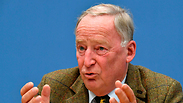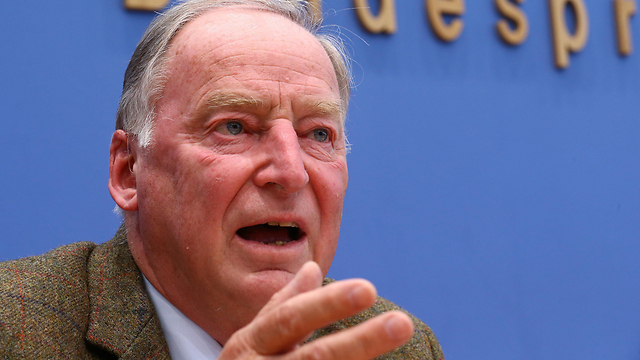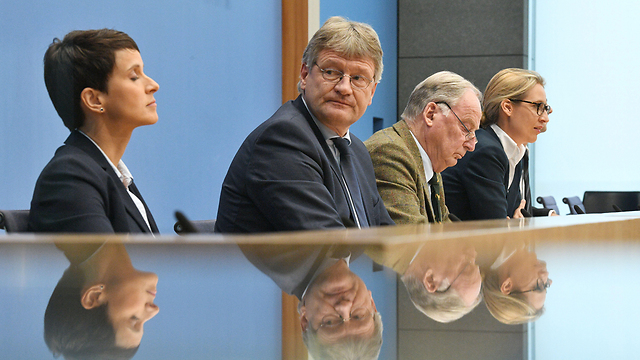

German nationalist leader: Jews have nothing to fear
Alexander Gauland, co-leader of Alternative for Germany (AfD), insists 'there is nothing in our party, in our program, that could disturb the Jewish people who live here in Germany,' despite past comments from fellow party leader calling for a 'U-turn' in the way Germany remembers its Nazi past.
Alexander Gauland, the co-leader of the anti-immigration Alternative for Germany (AfD), said Monday Jews have nothing to fear from his party's third-place election finish that took it into parliament.
Several major Jewish groups expressed dismay and concern Sunday about the strong showing of AfD.
The Anti-Defamation League also called the AfD result a "disturbing milestone," saying "its leaders have made anti-Semitic statements and played down the evil of the Nazi regime."
Among other statements that have caused concern, AfD's leader in Thuringia state, Bernd Hoecke, called for a "U-turn" in the way Germany remembers its Nazi past, while Gauland himself has repeatedly insisted "we have the right to be proud of the achievements of Germans soldiers in two world wars."
Still, Gauland insisted that "there is nothing in our party, in our program, that could disturb the Jewish people who live here in Germany."
He added that he hadn't met with Jewish leaders, but was "ready at any time" to do so.
Germany's mainstream parties have all ruled out teaming up with AfD, which is one of six caucuses in the new parliament after winning 12.6 percent of the vote. Including the seat Petry won, it has 94 of the 709 seats.
Co-leader Alice Weidel told reporters their plan was to provide "constructive opposition."
"We have a very clear mandate from the voters, and there is no time to waste," she said.
AfD drew support from people who previously voted for Chancellor Angela Merkel's conservative bloc and from many who didn't previously vote at all. To a lesser extent, it also drained support from the center-left Social Democrats and others.
Its success followed a campaign focused on criticism of the chancellor's decision to open the country's doors to more than 1 million asylum-seekers over the past two years. It performed most strongly in Germany's formerly communist and less prosperous east, capturing 22.5 percent of the vote there—27 percent among male voters.
However, long-running cracks at the top of the party, known by its German acronym AfD, erupted in public when co-chairwoman Frauke Petry—one of AfD's best-known faces but sidelined over recent months—stormed out of a press conference. That left three other top party leaders chuckling and smirking, but briefly speechless.
"An anarchic party ... can be successful in opposition, but it cannot make voters a credible offer for government." Petry said, adding she wouldn't join AfD's parliamentary caucus. She walked out of the room without taking questions.
Co-chairman Joerg Meuthen apologized "on behalf of the party" for the episode, saying it was "not discussed with us," before moving on. Persistent leadership infighting so far has failed to do the party significant harm.
Petry turned AfD from opposing eurozone bailouts to a focus on migration after she ousted the party's founding leader in 2015, but recently had been sidelined after urging AfD to exclude members who express extremist views, with the aim of attracting moderate voters. While she said she wouldn't join the parliamentary group, she didn't say she was leaving the party.

















